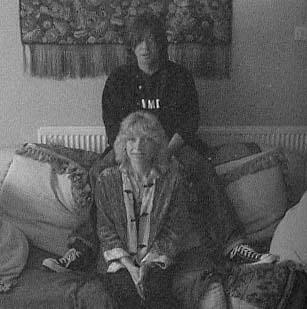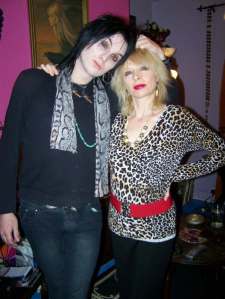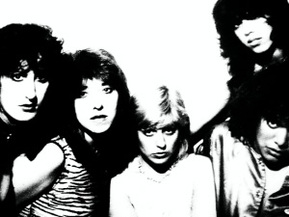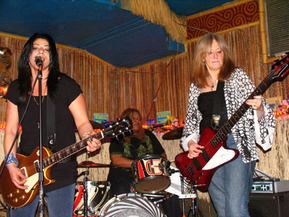I interviewed Nina Antonia for Venus Zine back in 2007. Her writing has been a huge influence on me. She has been a music journalist in Britain since the ’80s and wrote an amazing book called The Prettiest Star in the mid-’00s. It is about her experience growing up in Britain during the ’70s as a fan of Glam and Punk music, which I could really relate to, and she weaves her tale with the story of Brett Smiley, who is an underrated Glam Rocker, that was destined to be the next David Bowie, but whose career did not turn out as expected. It is quite a gripping story! I interviewed her not too long after that book came out, and got to talk to her about the book, as well as other people that she has written about such as the New York Dolls, Johnny Thunders (she wrote two books that have to do with Thunders, one about the New York Dolls and one about about his career) and Peter Perrett from the Only Ones.
Nina Antonia
Glitter in the Gutter: a legendary music journalist talks about the impact of Glam Rock on her life and the not-so-glamorous aspects of her writing career
By Bess Korey
In her recent book, The Prettiest Star: Whatever Happened To Brett Smiley?, legendary British music journalist, Nina Antonia, parallels her personal memoir with the biography of musician Brett Smiley. Smiley’s all too brief shot at fame as a Glam Rocker in the mid-’70s and subsequent fall into despair and addiction when things did not work out as planned, is brilliantly interwoven with Antonia’s tale of being a young music fan growing up in Liverpool, England.
Antonia’s life was changed forever by the burgeoning Glam Rock movement and the musicians with whom she was able to identify with from that scene, including the New York Dolls, their guitarist Johnny Thunders, and, of course, Smiley. The book spans a 30-year-period, chronicling the ups-and-downs of life faced by Smiley and Antonia, and ending on a high note when their lives intersected in the early 2000’s. During that time, they finally met in person, and Antonia played an important part in getting Smiley’s lost 1974 Glam Rock album, Breathlessly Brett, released on RPM Records.
Her early interest in the Dolls and Thunders led to her being the first person to ever write biographies about both subjects: The New York Dolls: Too Much Too Soon and Johnny Thunders: In Cold Blood
. She is known as an authority on the Dolls because of that and appears in a recent documentary, New York Doll, about the Dolls’ late bass player, Arthur “Killer” Kane. She has also written, The One and Only: Peter Perrett, Homme Fatale
, on a founding member of the pioneering British Punk group, the Only Ones, and she has had articles published in renowned British music magazines, such as Mojo and Uncut. Antonia has certainly come a long way from being an unhappy little girl who used her daydreams of the Dolls, Thunders, and Smiley as an escape. In the following interview, which was conducted via e-mail during March of 2007, she candidly discusses her journey.
Bess Korey: In The Prettiest Star you mentioned that when you were trying to find a publisher for your first book, Johnny Thunders: In Cold Blood, one of the publishers you showed the book to had the gall to tell you that women shouldn’t and can’t write about music. The lengthy resume that you have created as a music writer since then has certainly proved him wrong. Was that the only time that you have had to deal with sexist behavior in the publishing world or have there been other instances over the years as well? Also, do you think that people have become more accepting of female music journalists since the ’80s, or does it seem to you like women who write about music are still made to feel like they have something to prove?
Nina Antonia: Throughout my time as a Rock n’ Roll writer, I’ve often had to deal with sexism, so the first incident which you mention, from The Prettiest Star, was kind of a precursor. It’s not quite as bad [now] as it was in the ’70s. But I’ve watched as male contemporaries in the same field have been offered the opportunity to make a decent career, while I’ve had to scratch [out] a living.
In the music press there is still the sense that the male voice, in print, at least, is the most authoritative. In the UK, there are usually one to two women writing for each Rock magazine, if they’re lucky. This is the quota filled. I have to admit, however, that I’m also not “one of the boys.” I don’t hang out at the pub with the guys from whatever Rock mag, and this also goes against the grain, as do the bands I’m usually associated with.
The most infuriating incident I encountered was from an American writer, a woman; which made it all the more galling; who was writing a book about women in Rock n’ Roll and contacted me about two years ago with a query about ’70s groupie glamour queen, Sabel Starr. I was as helpful as possible and let her know that I did the last interview with Sabel in my New York Dolls book. Ironically when the book came out, the journalist sourced a male author, who hadn’t actually spoken to Sabel, and totally ignored the Dolls book. I got a teensy thanks, which was lost in the footnotes.
I can’t say whether people have become more accepting of female music journalists, because I can only answer from my own experiences. On a more positive note however, I do get lovely feedback about my books from lots of guys so the “fault,” if there is one, lies within the media’s attitude, not with the Rock reader.
From what can be gathered in reading about your life in The Prettiest Star, you’ve never been reckless or self-destructive like the musicians that you choose to write about. Why do you think that you have such a strong desire to write about the dark side of Rock n’ Roll? And does writing about such things help you stay grounded?
I suppose you could say I was emotionally reckless and self-destructive in some of the relationships I embarked upon, but as a single parent I had to learn to survive as well. I probably have a strong desire to write about the dark side of Rock n’ Roll because it reflects something in me, an echo of my childhood, which fashioned my outlook on life.
Also traditional success stories are pretty boring, I’d rather write about the authentic: people who have had to struggle yet triumphed by getting their records out against the odds, people whose lives are real. I hate high gloss, air brushed perfection and MTV homogenization. Authors like Nelson Algren, John Rechy, and Jean Genet influenced me, because they understood the poetry of the gutter. I am grounded because I’ve had to be to pay the rent.
How would you describe Brett Smiley, and the effect he has had on your life, to people who have not read your book?
The Prettiest Star, which is both Brett’s biography and my autobiography, is, amongst other things, a reflection on the ephemeral quality of pop music. As a Glam phenomenon, Brett was as fleeting as a snowflake, which gave him and the music a magical quality. He was the Greta Garbo of teeny-pop; elusiveness can be a great quality.
The “imaginary” Brett character belongs to my early teens. Brett Smiley of today is a very different person; much more earthy, as is his music. I perceive him like a figure in a fairy story, someone remembered from another lifetime, whilst wishing the real Brett all the very best with his future endeavors. Besides, he is very much concerned with the now, as well.
What inspired you to write a book about Peter Perrett of the Only Ones?
Peter is like a modern day Baudelaire. If you don’t know Baudelaire’s work, it’s incredibly contemporary in its jaded cynicism, yet it has a timeless, morbid beauty to it. Perrett and Baudelaire also share the same predilections for dissipation as well. Perrett is one of the most anti-establishment people I’ve ever met; he refuses to live within society’s rules. Peter is a truly mythical figure, I once described him in an article as being the “Syd Barrett of the new wave”; there is a lot of mystique surrounding Perrett that continues to exert a fascination over people.
The Only Ones’ music is kind of baroque, grandiose almost. It’s the sound of opium dreams and car crashes, refinement and chaos. The Only Ones have just reformed and are going to be playing gigs this summer in England, so I may update the book.
Even though you’re a female writer, you’ve chosen to chronicle the lives of male musicians, as opposed to female ones. Does gender play a role at all when you choose the topics you want to write about?
The two female artists I would have most wanted to write about were Debbie Harry and Nico, I think they are both wonderful and, indeed, I’ve done sleeve notes for a Nico CD. However, I always write about artists who have largely been under the radar, in terms of media coverage. When I wrote about the New York Dolls, they hadn’t yet reformed and hit the comeback trail, but that’s a bit of a tangent. What I’m trying to say is that I didn’t think there was a need for me to write about Debbie Harry or Nico, as there were perfectly good books already out about both of them. It’s not an issue of gender either, it’s always been about whose work and style moves me.
Which book do you like best out of the four you’ve written, and is that the one you enjoyed writing most?
Johnny Thunders; In Cold Blood is the one that means the most to me, because it was my first book and entailed a lot of struggle. I put my soul into it and got to work closely with Johnny, who was my Rock n’ Roll hero. It’s also the book that I get the most feedback on. Johnny captured a lot of people’s hearts and In Cold Blood is an authentic document. It originally came out in 1987, first editions can cost quite a lot if you can find a copy. I only have one left. It was revised and updated a couple of years ago and it’s the new version, available through Cherry Red Books, that is still in print.
Are you working on any new books or projects right now?
I had a difficult experience with the last book I tried to get off the ground, which was going to be an alternative look at Glam. At this stage of the game, I’m too weary to fight for what should be obvious, i.e., a decent advance and a reasonable timeframe for writing a book.
Right now I’m concentrating on managing a band called the Skuzzies. Their front man, Crooked J, is my partner. If I’m going to write about any band at all, it will be the Skuzzies. They have the grimy allure of the city after midnight and incorporate everything I’ve ever found inspiring in music and literature, whilst being totally themselves.
When you were younger, could you have ever imagined that your life would turn out this way? Does the fact that you have been so involved with the lives of your heroes seem surreal to you at all, or does it just feel normal now?
In my early teens I spent most of my life in daydreams, as this was preferable to real life. My dream was to meet Johnny Thunders. I suppose my dreams came true but of course things never turned out in the way one anticipates. Life is bittersweet, as were my experiences of getting to know Johnny and writing his biography. His life was far from perfect, as was mine, but it was still the realization of something very special and finding creative fulfillment is rewarding.
Writing Too Much Too Soon was a completely different experience, it was more of an elegy to the original New York Dolls, a fond goodbye. To answer your question, I don’t think I could have lived my life any other way. My books gave me a voice that would otherwise have gone unheard.



